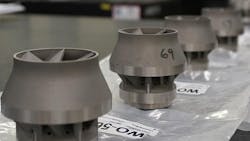GE, Siemens Invest, Re-Commit to Metal Manufacturing
Two of the most influential engineering and manufacturing groups are renewing their commitment to metal additive manufacturing with significant investments — raising the profile for the emerging technology in the production critically engineered parts.
General Electric, which already applies additive manufacturing to produce critical parts (e.g., fuel nozzles for turbofan engines) will pay a total of $1.4 billion to buy two suppliers of additive manufacturing equipment, Arcam AB and SLM Solutions Group AG. Both companies will be assigned to the GE Aviation business.
“Additive manufacturing is a key part of GE’s evolution into a digital industrial company,” stated chairman and CEO Jeff Immelt. “Additive manufacturing will drive new levels of productivity for GE, our customers, including a wide array of additive manufacturing customers, and for the industrial world.”
GE stated it expects to grow the new business to $1 billion by 2020, and also expects $3-5 billion of “product cost-out” across the company (via digital industrial strategies) over the next 10 years.
Arcam AB, a Swedish manufacturer, is credited with inventing an electron-beam melting process for metal additive manufacturing. It also produces advanced metal powders, supplying customers in aerospace and healthcare industries.
SLM Solutions Group, a German company, produces laser-melting machinery for metal additive manufacturing, for aerospace, energy, healthcare, and automotive manufacturers.
“Additive manufacturing fits GE’s business model to lead in technologies that leverage systems integration, material science, services and digital productivity,” stated GE Aviation president and CEO David Joyce.
Focus on Turbomachinery
Siemens AG has acquired an 85% stake in Materials Solutions Ltd., an additive manufacturing company producing nickel-superalloy parts for land-based and aerospace gas turbines, and specialty steel and titanium components for aerospace systems and performance automotive systems. The value of the acquisition was not announced. Just over a year ago, Siemens made a “strategic investment” (14%) in the Worcester, England, company via its Siemens Venture Capital unit.
The remaining 15% stake will be held by Materials Solutions founder Carl Brancher.
Materials Solutions uses “selective laser melting” (SLM) to produce high-performance metal parts, principally turbomachinery parts for gas turbines, both land-based and aerospace turbines, parts for which dimensional accuracy and surface finish are critically important design details.
Brancher commented that his organization’s "know-how and experience will make a significant contribution to Siemens' additive manufacturing strategy. Materials Solutions is developing the applications know-how and a supply chain for the world's most advanced engineering companies – delivering processes and precision parts from 3D CAD models, using software, lasers and metal powders," he added.
Materials Solutions has 20 employees, and has multiple customer approvals for its additive-manufactured parts. Importantly, the operation is certified to AS9100, an aerospace sector quality standard.
According to Siemens, its new acquisition will continue to support external customers.
"With the acquisition of Materials Solutions, we are able to secure world-leading expertise in materials and AM process development with focus on high-temperature super alloys,” stated Willi Meixner, CEO of Siemens Power and Gas Division. “The company's strength is to turn models into high-quality components in record time. Clearly, Materials Solutions fits perfectly within our vision for growth and application of advanced technologies within our Power & Gas portfolio."
Siemens already operates an additive manufacturing operation in Finspång, Sweden, for rapid-prototyping small fuel mixers, and performing rapid repair of burner tips for midsized gas turbines. Earlier this year, it started producing parts for commercial supply there, which it called the first step in its plans mass production and repair of metal parts using additive manufacturing.
About the Author
Robert Brooks
Content Director
Robert Brooks has been a business-to-business reporter, writer, editor, and columnist for more than 20 years, specializing in the primary metal and basic manufacturing industries. His work has covered a wide range of topics, including process technology, resource development, material selection, product design, workforce development, and industrial market strategies, among others. Currently, he specializes in subjects related to metal component and product design, development, and manufacturing — including castings, forgings, machined parts, and fabrications.
Brooks is a graduate of Kenyon College (B.A. English, Political Science) and Emory University (M.A. English.)
